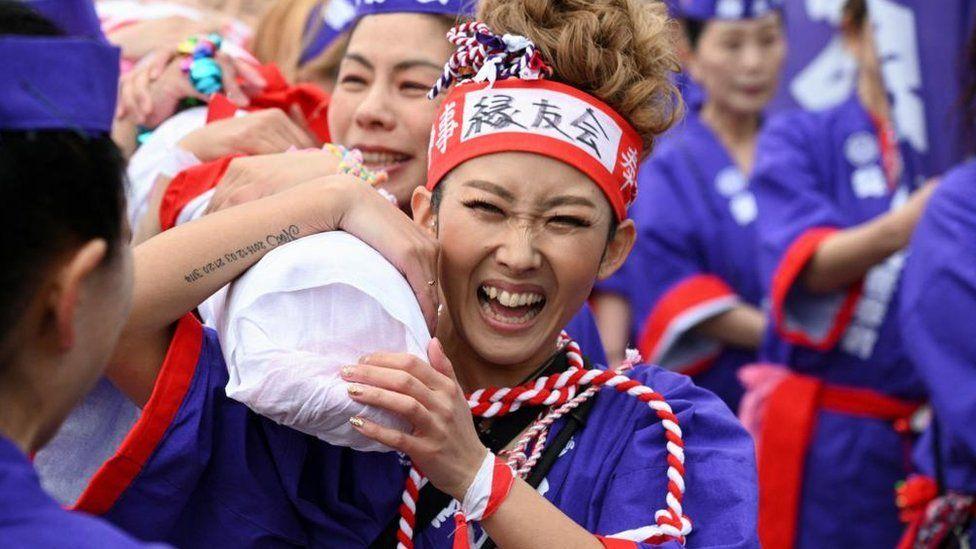
Di sea of chanting, nearly-naked men tussle, push and shove towards di shrine. “Washoi! Washoi!” dey dey shout – make we go, make we go.
Na scene wey don barely change for di 1,250 years wey di Hadaka Matsuri, or di Naked Festival, don dey shele for di Konomiya Shrine, for central Japan.
But dis year change dey – big one.
Away from di men huddle, one group dey about to become di first women to eva take part.
Di women bin gada here, dem sabi say dem dey make history. To find room for traditionally male-dominated space dey difficult anywia, but for Japan – wey last year rank 125 out of 146 for di World Economic Forum gender gap index – e dey particularly hard.
No be say dem no always dey dia.
“For di background, women don always work veri hard to support di men for di festival,” Atsuko Tamakoshi tok – her family bin don dey work for di Konomiya festival for generations.
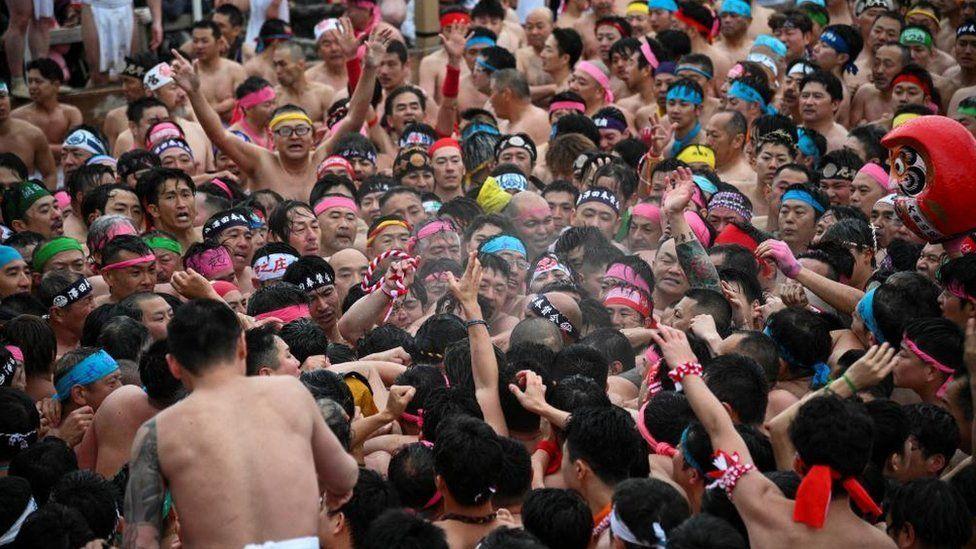
But di idea to actually take part for di festival – wey see di men attempt to drive away evil spirits, bifor dem pray for happiness for di shrine – be like say e neva come up bifor.
According to Naruhito Tsunoda, actual ban bin no dey. E just be say nobodi don eva ask.
And wen dem do, di ansa dey easy.
“I believe di most important tin na say make e be fun festival for evri one. I tink God go dey happiest about dat too,” e tell news agency Reuters.
No be evri one for di community dey as accommodating though.
“E get many voices wey dey concerned (about say we dey take part) – say, ‘Wetin women dey do for men festival?’, ‘Dis na men festival, e serious’,” Tamakoshi, one 56-year-old grandmother, explain.
“But we all dey united for wetin we wan do. We believe say God go watch ova us if we dey sincere.”
Di women wey dey wait for dia turn indeed dey sincere. Wetin dem no be na naked.
Instead many dey wear “happy coats” – long, purple robes – and white shorts, as against di men loincloths, while dem carry dia own bamboo offerings.
Dem no go be part of di big scramble wey accompany di men rush to di shrine, or di clambering ova one anoda to touch di Shin Otoko, or di ‘male deity’ – one man wey di shrine choose. To touch am, as di tradition dey go, suppose drive evil spirits away.
E no dey take away di significance of dis moment.
“I feel say times don finally change,” Yumiko Fujie tell BBC. “But I also feel one sense of responsibility.
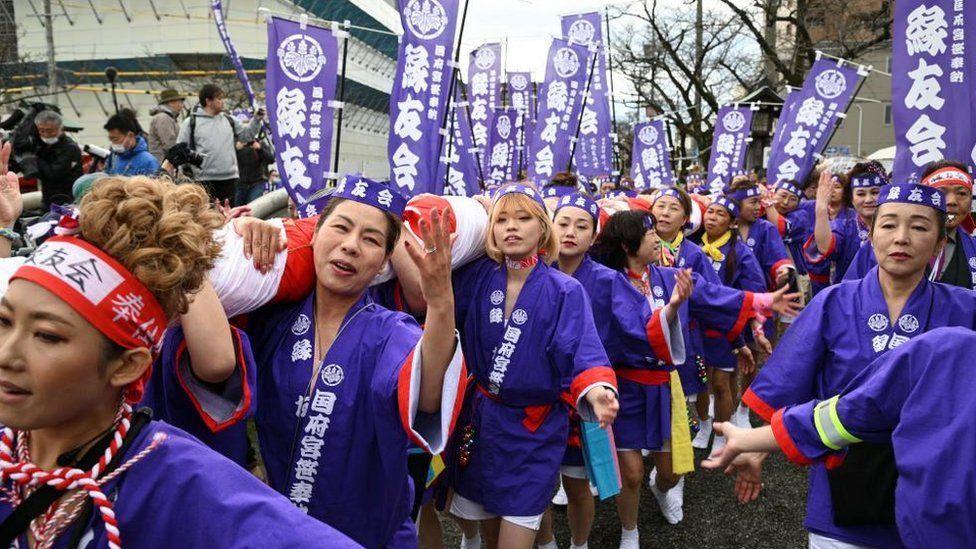
Dis women, however, no just dey break gender barriers wit dia participation. Dem also dey keep di tradition alive.
Dis week, anoda naked festival – bin hold for Kokuseki Temple for Japan north – say dis go be di last one wey dem go hold. Dem simply no get enof young pipo to keep di festival going.
Japan get one of di fastest ageing populations on earth. Last year, for di first time, more dan one inside 10 pipo dey age 80 or older. Meanwhile, dia birth rate stand for just 1.3 per woman, as na only 800,000 babies dem born last year.
Di moment don come for di women to make dia way to di shrine.
Dem tanda for two parallel lines and carry di long bamboo sticks wey dem wrap for di intertwined red and white ribbons.
Atsuko Tamakoshi dey lead di way – blow her whistle to prompt di rhythmic chant wey dem don hear di men say for plenti years.
‘Washoi Washoi,” di women shout.
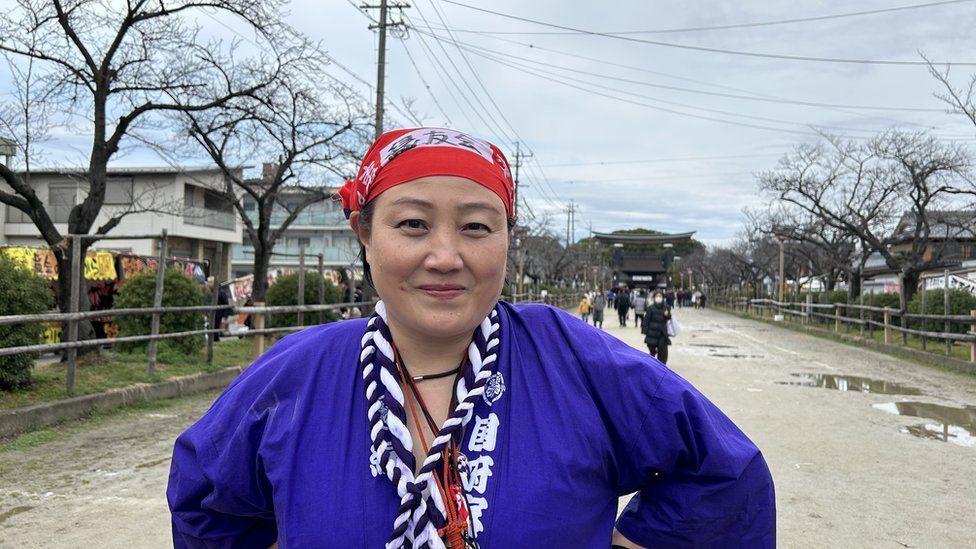
Di women focus on di movements and speed wey dem don practice for weeks. Dem sabi say dem gatz get dis right.
Dem sabi say di eyes of di media and di spectators dey on dem, dem also dey smile mix of nerves and excitement.
Supportive cries dey from di crowd wey dey watch, some dey shout “Gambatte” or ‘dey go on!’, as dem push through di freezing temperatures.
Dem enta di Konomiya Shinto shrine courtyard and, like di men, dem dey spray wit cold water. E be like say e dey energise dem even more.
Afta dia offering dem accept, di women end di ceremony wit di traditional salutation of two bows, two claps and one final bow.
And den, di enormity of di moment set in. Di women burst wit cheers, dem jump around and hug each oda and cry. “Arigatogozaimasu! Arigato!” Tank you! Tank you! Dem say to each oda and di crowd now dey applaud dem.
“I get so teary,” Michiko Ikai tok. “I no sure say I fit join, but now I feel sense of achievement.”
As dem make dia way out of di shrine, di women dey stopped by members of di public wey wan take pictures wit dem and media outlets wey wan interview dem. Dem happily agree.
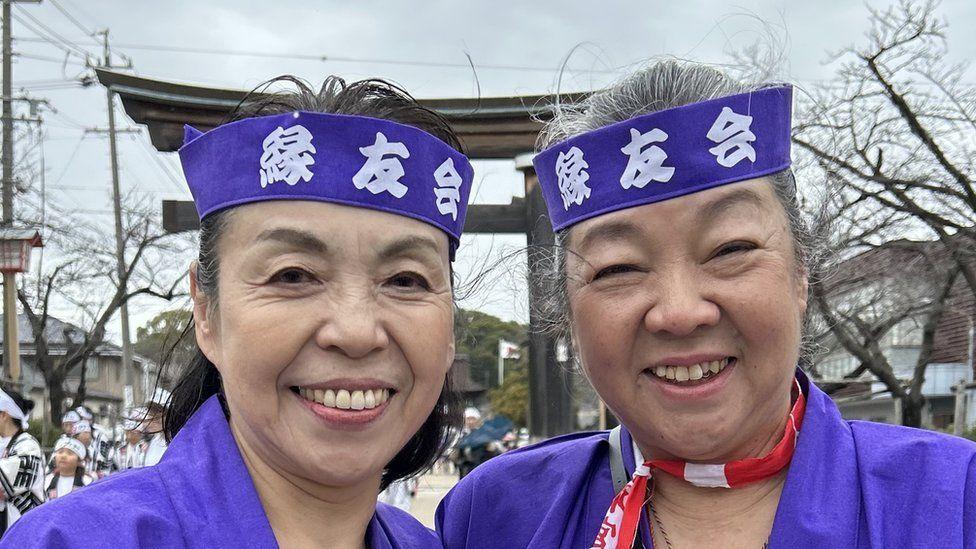
“I don do am. I dey so happy,” Mineko Akahori tell BBC. “I dey really grateful say as woman, I fit participate for di first time.”
Her friend and teammate Minako Ando add say to simply “become di first to do somtin like dis just great”.
“Times dey change,”Hiromo Maeda tok. Her family bin don dey run one local inn wey don host some of di male festival-goers for di last 30 years.
“I tink say our prayers and wishes dey di same. E no mata if na man or woman. Our passion na di same.”
For Atsuko Tamakoshi, wey don play dat key role for di day, e get one moment to reflect on wetin all of dem don achieve togeda. She dey both emotional and relieved.
“My husband don always take part for dis festival,” she tell BBC. “And I bin dey look. I now dey filled wit gratitude and happiness.”








